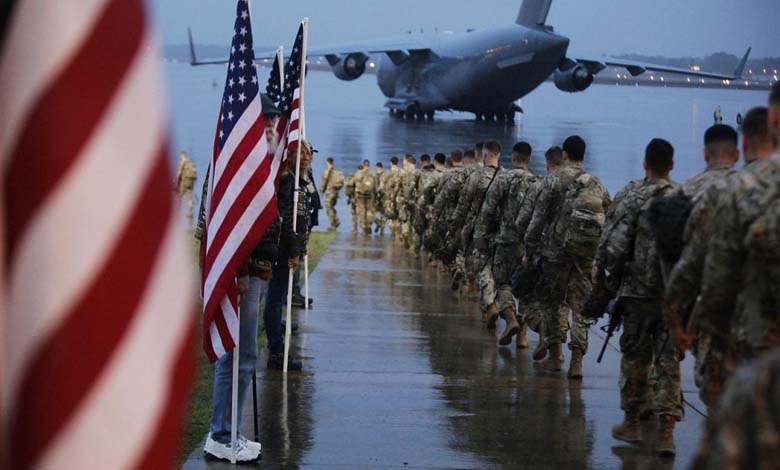Iranian Interests Behind the Coordination Framework’s Persistence in Expelling U.S. Forces from Iraq

A senior figure in the Coordination Framework affirms that there is no backing down from the demand to remove U.S. forces, amid the looming threat of military action against Tehran should nuclear negotiations fail.
On Thursday, the Coordination Framework reaffirmed its firm stance on the need to expel American forces from Iraq. This position is seen as a direct response to recent reports suggesting that some voices within the Framework and other Iraqi political forces are calling for the U.S. presence to remain, especially in light of regional security shifts—most notably the developments in Syria following the fall of President Bashar al-Assad’s regime, a key ally of Tehran. There is growing concern that the U.S. military might use its bases in Iraq to launch strikes on Iranian territory if nuclear talks reach a dead end and the military option is pursued.
-
U.S. Report: Iran Supplies Long-Range Missiles to Iraqi Factions for the First Time
-
Iran Reshuffles Its Proxies in Yemen and Iraq amid U.S. Strikes
MP Waad al-Qado, speaking on behalf of the Coordination Framework, stated: “There is no withdrawal from the Framework or the Iraqi government regarding the demand to expel U.S. forces from Iraq.” He added that a new round of negotiations will soon take place between Baghdad and Washington to resume discussions on this matter and implement prior agreements through technical and military committees.
These statements aim to refute recent political and media claims suggesting a “tacit acceptance” or retreat from the demand for foreign troop withdrawal—especially as those sources highlighted the “strategic importance of the U.S. presence in regional balance” after the decline of Iran’s axis and the rise of groups labeled extremist in Baghdad.
-
After Iraqi Factions Abandoned It, Khamenei: Iran Does Not Need Proxies in the Region
-
U.S. Warnings of an “Imminent” Turkish Operation in Northern Syria
Nonetheless, the Coordination Framework, Iran’s primary ally in Iraq, reiterated that the expulsion of U.S. forces is a “national and sovereign demand,” aligning with Iran’s view that continued American military presence in Iraq is a direct threat to its security. This comes amid heightened tension between Tehran and Washington and stalled nuclear negotiations.
While the Iraqi government, according to its ministerial program, remains committed to enforcing the parliament’s January 2020 decision to expel foreign forces, the situation remains complicated. Some political voices warn that a hasty withdrawal could disrupt the security balance in certain regions, creating a power vacuum exploitable by extremist groups or non-state militias.
-
The Pentagon is “powerless” against mysterious drones… Unchecked intrusions over a U.S. base
-
The Fate of Syrian Officers in Iraq Depends on Agreements with Syria
Conversely, parts of the Coordination Framework believe that even under the guise of training or advisory roles, U.S. troop presence continues to undermine Iraqi sovereignty and gives Washington a broad platform for surveillance or even conducting operations targeting regional players—namely Iran. Iranian concern over American bases in Iraq is not new but has intensified amid speculation that Washington could use these bases to launch a surprise military strike if nuclear negotiations collapse.
Although Iraq’s calls for U.S. withdrawal are framed in nationalistic and sovereign terms, the strategic ties between some Iraqi political factions and Iran cast doubt on the true motives behind the insistence. For Tehran, the American military presence in Iraq is no longer a potential threat but a clear and present danger.
-
Iran Authorizes Al-Sudani to Decide the Fate of Iraqi Factions Loyal to It
-
Tehran Begins Renovation of the “House of Resistance” by Expanding Armament for Iraqi Popular Mobilization Forces
Observers view the Framework’s renewed pressure as part of a “pre-emptive fortification” of Iraq’s frontlines, in a broader regional game where Tehran aims to curb U.S. influence in Baghdad to limit Washington’s options should an open confrontation erupt.
In September 2024, Baghdad and Washington announced a preliminary agreement for the gradual withdrawal of international coalition forces from Iraq. However, implementation faces both internal and external challenges—chief among them, disagreement over the role some U.S. forces might continue to play under different labels such as logistics or intelligence support.
-
Al-Sudani: We Successfully Kept Iraq Out of War and Conflict Zones
-
After Iraqi Factions Abandoned It, Khamenei: Iran Does Not Need Proxies in the Region
The Coordination Framework’s political factions are awaiting the outcome of the next round of Iraqi-American dialogue, warning against any “complacency,” according to MP Waad al-Qado, who emphasized that the Framework’s stance will be decisive if earlier agreements do not result in actual troop withdrawal.
The debate over the presence of U.S. forces in Iraq cannot be separated from the country’s internal political balance, as political factions remain divided between those who view this presence as a temporary security necessity and those who see it as a direct violation of national sovereignty. What further complicates the issue is its entanglement with regional agendas, particularly amid the ongoing escalation between Iran and Israel and Washington’s hints at potentially leveraging its assets in the region.
Ultimately, the determination shown by the Coordination Framework stems not only from a domestic conviction that the “foreign presence” must end, but also, in part, from a strategic Iranian desire that sees Iraq as a vital sphere of influence in any potential confrontation with the United States.
-
Al-Sistani Warns “Al-Itar” in an Angry Message: “Syria’s Events Could Be Repeated in Iraq”
-
Iran Relies on Houthis and Iraqi Militias to Support Gaza
-
Fears that ISIS may exploit regional wars to re-emerge in Iraq… Details












